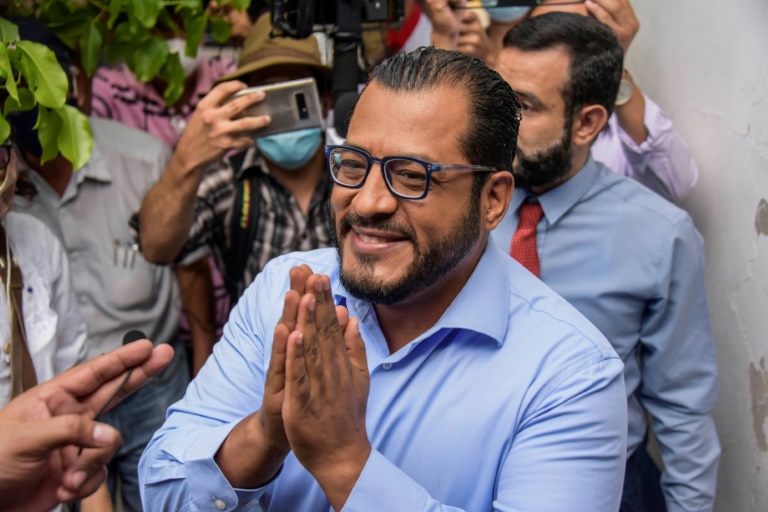The global community urged Nicaragua Wednesday to free four recently-detained opposition presidential candidates, as the United States announced sanctions against allies of long-serving leader Daniel Ortega.
The detention of the four — the last two of whom were rounded up on Tuesday — has legally ruled them out of November presidential elections in which Ortega is widely expected to seek a fourth consecutive term.
Ortega’s moves against would-be challengers have elicited widespread condemnation of what some have called “dictator” tactics.
UN chief Antonio Guterres was “very concerned by the recent arrests and detentions,” his spokesman Stephane Dujarric told reporters.
The secretary-general, he added, “calls on the authorities to release the political leaders and reinstitute their political rights.”
The United States announced sanctions against four Nicaraguan officials who support Ortega, including the president’s daughter, while accusing the regime of undermining democracy and abusing human rights.
The United States called on Ortega “to immediately release presidential candidates… as well as other civil society, opposition leaders who have been arrested over the past week,” State Department spokesman Ned Price said.
Luis Almagro, secretary-general of the Organization of American States, meanwhile on Twitter urged the release of all “political prisoners in #Nicaragua,” adding that “the harassment and oppression of the dictatorship of… Daniel Ortega must stop.”
– ‘Inciting foreign interference’ –
The clampdown started a week ago when Cristiana Chamorro, a journalist not affiliated with a political party, was placed under house arrest on government allegations of money laundering, widely regarded as trumped up accusations.
Chamorro had announced she would seek nomination as an opposition candidate, and a recent poll showed her to be the favorite to beat Ortega, just as her mother, ex-president Violeta Barrios de Chamorro, did in 1990.
Three days after Chamorro’s arrest, 67-year-old Arturo Cruz was detained and later ordered held in pre-trial detention on allegations of “provocation… and conspiracy to commit harm to national integrity.”
He had announced his presidential candidacy two months prior for the conservative Citizens’ Alliance for Freedom.
Then on Tuesday, police detained Juan Sebastian Chamorro Garcia, 50, and Felix Maradiaga, 44.
Chamorro Garcia, Cristiana Chamorro’s cousin and a would-be presidential candidate for the Civic Alliance for Justice and Democracy, is being investigated for “inciting foreign interference in internal affairs,” among other crimes, police said.
Maradiaga, a presidential hopeful for the UNAB opposition coalition, was being held for alleged acts against sovereignty, terrorism and backing international sanctions against the government.
– ‘Credentials as a dictator’ –
Tuesday’s round-up continued into the night, with the arrest of well-known businessman Jose Aguerri and human rights activist Violeta Granera on similar charges, according to police.
Julie Chung, the top US diplomat for Latin America, tweeted the arrests “should resolve any remaining doubts about Ortega’s credentials as a dictator. The international community has no choice but to treat him as such.”
Hours later, the US Treasury announced the sanctions targeting Ortega’s daughter Camila Antonia Ortega Murillo, Central Bank President Leonardo Ovidio Reyes Ramirez, ruling party MP Edwin Ramon Castro Rivera and Julio Modesto Rodriguez Balladares, a brigadier general in the national army.
The measures block all their assets and freeze them out of the US financial system.
“President Ortega’s actions are harming Nicaraguans and driving the country deeper into tyranny,” said Andrea Gacki, director of the Treasury Department’s Office of Foreign Assets Control.
– ‘Bunch of thieves’ –
Most of the charges against the would-be presidential candidates stem from a law initiated by Ortega’s government and approved by parliament in December to defend Nicaragua’s “sovereignty,” which has been criticized by opponents and rights bodies as a means of freezing out challengers.
The law prevents Nicaraguans from running for elected office if the government deems that they led or financed a coup, promoted terrorism, or incited foreign interference, among other crimes.
Ortega, an ex-guerrilla who governed Nicaragua from 1979 to 1990, returned to power in 2007 and won two successive reelections.
Now 75, he has been accused by the opposition and NGOs of increasing authoritarianism and the brutal suppression of demonstrations against his government that started in 2018.
Nicaragua is under European Union and United States sanctions.
Last month, Nicaragua’s legislature appointed a majority of governing party-aligned magistrates to the election body that will oversee the vote.
It has since disqualified two parties.










